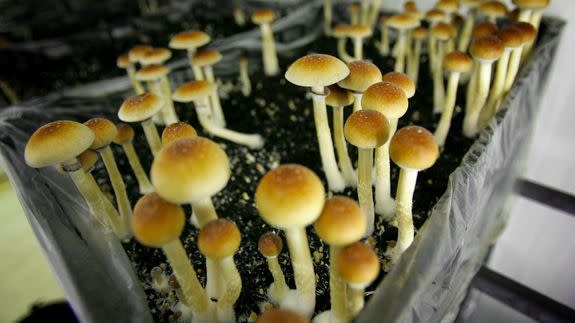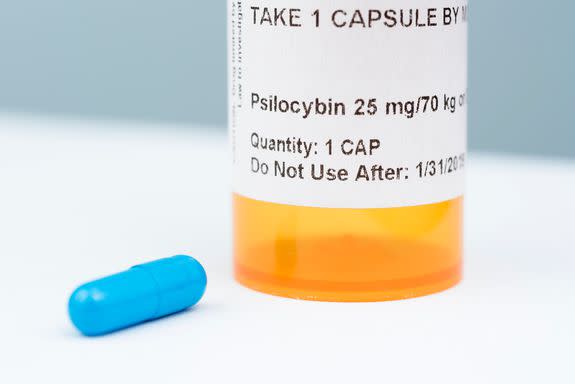Magic mushrooms ease anxiety in cancer patients, studies show

After Tammy Burgess was diagnosed with ovarian cancer at 55, she fell into the grips of crippling anxiety.
"I would just lay on the couch. I didn't go to work," she recently told researchers at New York University's Langone Medical Center. "When you're anxious about cancer, everything else becomes anxious."
But Burgess said she eventually broke free of her existential fears, thanks to a surprising treatment: a capsule of psilocybin, a mind-altering compound found in magic mushrooms.
"It was so peaceful and so beautiful," Burgess recalled.
SEE ALSO: Ecstasy can reduce fears and stress in PTSD patients. Here's how.
Burgess was among 29 participants in a small clinical trial to see whether psilocybin — a banned substance in the United States — could ease anxiety and depression in cancer patients. Participants, who all had cancer, received the doses in an eight-hour, supervised session together with psychological counseling.
The trial's results were published Thursday in conjunction with a similar study by Johns Hopkins University School of Medicine, which involved 51 cancer patients.
In the trials, researchers had to secure federal waivers to use psilocybin. The naturally occurring compound is listed as a Schedule 1 substance under the U.S. Controlled Substances Act, meaning it is banned as the federal government has ruled it has no accepted medical use. Marijuana is also a Schedule 1 substance.
The psilocybin studies found that just a single dose of the drug could significantly reduce depression and anxiety in people suffering from cancer with limited side effects, according to the research published in the Journal of Psychopharmacology.
About 80 percent of participants in the two studies showed clinically significant reductions in both psychological conditions that lasted for more than six months. After participants ingested the psilocybin, researchers continued to track their clinical evaluation scores for anxiety and depression over several months. Participants received therapy sessions before and after consuming the drug.
The studies add to a growing body of research exploring the potential therapeutic benefits of psychedelic substances. Earlier this week, the U.S. Food and Drug Administration gave the go-ahead to a large-scale trail of MDMA, a.k.a ecstasy, for patients with post-traumatic stress disorder.
While researchers studied health impacts of psychedelic drugs in the 1950s and '60s, much of their work was halted after the substances became criminalized in the '70s and '80s. Researchers have only recently resumed these types of studies in the last decade or so.
"Our results represent the strongest evidence to date of a clinical benefit from psilocybin therapy, with the potential to transform care for patients with cancer-related psychological distress," Stephen Ross, lead investigator for the NYU study and director of substance abuse services at NYU Langone, said in a statement.
Roland Griffiths, a neuroscience professor at Johns Hopkins, noted that traditional psychotherapy offered to cancer patients, such as behavioral therapy and antidepressants, may not take effect for weeks or months, if ever.
"The most interesting and remarkable finding is that a single dose of psilocybin, which lasts four to six hours, produced enduring decreases in depression and anxiety symptoms, and this may represent a fascinating new model for treating some psychiatric conditions," Griffiths said in a news release.
Besides creating conscious-expanding experiences and unleashing a wave of compassion and connectedness, eating too many magic mushrooms can cause nausea, vomiting, lack of coordination — or even lead to death in extreme scenarios.
Researchers leading the clinical trials stressed that they gave patients the psilocybin capsules under tightly controlled conditions and in the presence of clinically trained monitors. They cautioned against using the compound outside of such a research or patient care setting.
Jeffrey Lieberman, a former president of the American Psychiatric Association, and Daniel Shalev of the New York State Psychiatric Institute were among the leaders in psychiatry, palliative care and drug regulation who provided commentary in support of the new research.
The studies are "a model for revisiting criminalized compounds of interest in a safe, ethical way," they wrote. Lieberman and Shalev said easing research restrictions on psychedelics would open up "much potential for new scientific insights and clinical applications."

Image: NYU LANGONE MEDICAL CENTER
Other experts, however, express skepticism about the results. William Breitbart, who chairs the psychiatry department at Memorial Sloan-Kettering Cancer Center in New York, said the diversity in the participants' cancer diagnoses undermined the studies' findings.
Patients included people with early-stage cancer up to imminent terminal illness, making it harder to know which patients might have found relief from anxiety and depression without psilocybin, the New York Times reported Thursday.
"Medical marijuana got its foot in the door by making the appeal that 'cancer patients are suffering, they're near death, so for compassionate purposes, let's make it available,'" Breitbart told the newspaper. "And then you’re able to extend this drug to other purposes."
BONUS: Stunning images of the supermoon from around the globe

